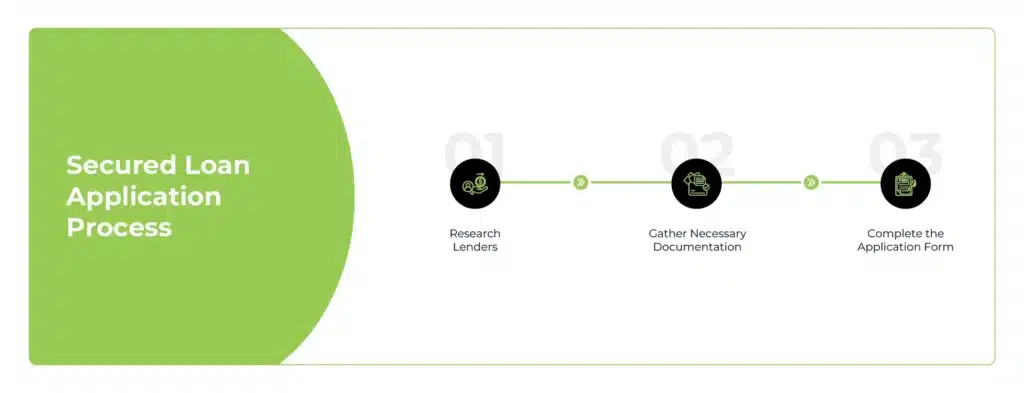You’ve got big dreams for your business or personal life, a dream home, expanding your company, or consolidating debt to simplify your finances. But when it comes to funding these goals, you might feel stuck or overwhelmed. That’s where secured loans can help.
A secured loan is like a helping hand, offering you the funds you need while allowing you to leverage an asset as collateral. However, qualifying for one can feel daunting if you’re unsure about the requirements or the process.
This guide will break everything down step by step, making it easy to understand what’s needed and how to qualify for a secured business loans UK. Whether you’re just starting your journey or looking to streamline the process, we’ve got you covered.
Key Takeaways:
- Eligibility: Focus on your credit score, income stability, and strong collateral.
- Application Process: Take time to research lenders, gather documents, and fill out forms accurately.
- Timeline: Plan for about 1–2 weeks from start to finish, depending on the specifics of your loan.
How to Qualify for a Secured Loan
What Makes You Eligible?
Secured loans aren’t just about borrowing money; they’re about trust. You’re showing the lender that you’re serious about repaying by offering collateral. Here’s what matters most:
-
Credit Score Requirements
Think of your credit score as your financial CV. It tells lenders how well you’ve handled debt in the past. While a higher score can make the process smoother, don’t lose hope if your score isn’t perfect.
For example, Claire, a small business owner, had a mid-range credit score of 680. She worried this might hold her back. But by providing a solid collateral option – her commercial property – she secured the loan she needed to expand her operations.
-
Income Verification
Your income proves your ability to repay the loan. Whether you’re employed, self-employed, or running a business, lenders want to see a steady stream of income. This might include pay stubs, bank statements, or tax returns.
Imagine Mike, a freelance graphic designer. His irregular income initially raised questions, but submitting a detailed record of his earnings and client contracts reassured his lender of his financial stability.
-
Collateral Evaluation
Collateral is the backbone of a secured loan. Lenders need assurance that the asset you’re offering—whether it’s property, a vehicle, or savings, can cover the loan if repayment becomes an issue.
Types of Collateral Commonly Accepted
- Real Estate: A family home, commercial property, or even land is often the strongest form of collateral. Real estate often provides the highest loan amounts due to its significant value.
- Vehicles: Cars or trucks can work, but remember that their value depreciates over time.
- Savings Accounts: These are highly secure and straightforward options since they maintain a stable value.
Before committing, ask yourself: Am I prepared to put this asset on the line? Being honest with yourself is the first step to making an informed decision.
Secured Loan Application Process
Step 1: Research Lenders
Not every lender is a good fit for your needs. Start by exploring banks, credit unions, and online lenders. Compare interest rates, repayment terms, and customer reviews. Don’t rush – this is an important decision. Learn more about tips for negotiating better terms in our helpful guide.
For example, Sarah spent two weeks researching lenders before choosing one that specialised in loans for small business owners. The extra time paid off, as she found better terms than she initially expected.
Step 2: Gather Necessary Documentation
Preparation is everything. Lenders will require:
- Proof of income (e.g., tax returns, pay stubs)
- Proof of identity (e.g., passport, driver’s license)
- Collateral documents (property deeds, vehicle titles, savings account statements)
By having these ready upfront, you can avoid delays and show your lender you mean business.
Step 3: Complete the Application Form
Be honest and thorough when filling out your application. Mistakes can slow the process or even result in rejection. If you’re unsure about a section, reach out to your lender for guidance—they’re there to help.
A business owner once shared how he rushed through his application and accidentally listed the wrong collateral value. It took him an extra week to sort it out—time he could have spent on growing his company.
Timeline for the Loan Application Process
How Long Does it Take to Get a Secured Loan?
On average, the process takes 1–2 weeks, depending on various factors:
- Initial Application Review (1–3 Days)
Once you submit your application, the lender will verify your information. If any details are missing, they’ll reach out. - Collateral Appraisal (3–7 Days)
The lender will assess the value of your collateral. For property, this might involve a professional appraisal. - Final Approval and Funding (3–5 Days)
After all checks are complete, the lender will approve your loan and transfer the funds.
Factors That May Affect the Timeline:
- Incomplete documentation
- Complex collateral (e.g., multiple owners on a property title)
- The lender’s internal processes
On average, you can expect the process to take about 1–2 weeks.
Conclusion
Secured loans can be life-changing. They offer an opportunity to fund dreams, grow businesses, or overcome financial hurdles. But knowing how to qualify for a secured loan is and being well-prepared is the key to success.
Before applying, take a moment to assess your financial situation. Is this the right step for you? Are you comfortable with the collateral risk? By answering these questions and following this guide, you’ll be well-equipped to make informed decisions. And don’t hesitate to ask for help if you need it.
Ready to get started? Visit Funding Guru to check out secured loan options tailored to your needs.



